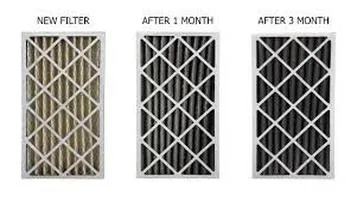Comprehensive Review of HVAC Filters: The Unsung Heroes of Indoor Air Quality
HVAC filters are essential components of heating, ventilation, and air conditioning systems, designed to improve indoor air quality by capturing airborne particles such as dust, pollen, mold spores, and other contaminants. These filters work by trapping particulates as air passes through the system, preventing them from circulating throughout the environment. Available in various types, including fiberglass, pleated, and HEPA (High-Efficiency Particulate Air) filters, each offers different levels of filtration efficiency. Choosing the right filter depends on factors like the specific air quality needs, the HVAC system’s specifications, and maintenance requirements. Regular replacement or cleaning of HVAC filters is crucial to ensure optimal system performance, enhance energy efficiency, and extend the lifespan of the HVAC system while promoting healthier indoor environments.

Heating, Ventilation, and Air Conditioning (HVAC) systems are fundamental to maintaining comfort and air quality in residential, commercial, and industrial settings. A critical but often overlooked component of these systems is the HVAC filter. These filters play a pivotal role in ensuring the air circulating through your space is clean, healthy, and free of contaminants. In this review, we will delve into the importance, types, performance, and maintenance of HVAC filters, highlighting why they deserve more attention than they usually receive.
Importance of HVAC Filters
HVAC filters are the first line of defense against airborne particles and pollutants. They trap dust, pollen, mold spores, pet dander, and even bacteria, preventing them from being recirculated in the air you breathe. The significance of this function cannot be overstated, especially for individuals with allergies, asthma, or other respiratory conditions. Moreover, clean filters contribute to the efficient operation of HVAC systems, preventing the buildup of dirt on the system's internal components, which can lead to reduced efficiency and higher energy costs.
Types of HVAC Filters
There are several types of HVAC filters, each with its own set of characteristics, advantages, and ideal applications:
1. Fiberglass Filters: These are the most basic and inexpensive type of HVAC filter. Made from layered fiberglass fibers, they are typically disposable and designed to protect the HVAC system rather than improve air quality. They are not the best option for those concerned with indoor air quality as they have a low MERV (Minimum Efficiency Reporting Value) rating, usually between 1 and 4.
2. Pleated Filters: Made from polyester or cotton paper, pleated filters have a higher surface area due to their pleated design, which allows them to capture more particles. They offer better filtration than fiberglass filters and have MERV ratings ranging from 5 to 13. They are a good balance between cost and performance and are suitable for residential use.
3. High-Efficiency Particulate Air (HEPA) Filters: HEPA filters are the gold standard for air filtration, capable of trapping 99.97% of particles as small as 0.3 microns. These filters have MERV ratings of 17 to 20 and are commonly used in environments where air quality is of utmost importance, such as hospitals and laboratories. However, they may require a more powerful HVAC system to handle the increased airflow resistance.
4. Electrostatic Filters: These filters use an electrostatic charge to attract and hold particles. They can be either disposable or washable and have varying MERV ratings. Electrostatic filters are particularly effective at capturing smaller particles and are a good option for homes with pets or smokers.
5. Activated Carbon Filters: These filters are embedded with activated carbon, which helps in removing odors and gaseous pollutants from the air. While they are not primarily designed to capture particulate matter, they are often used in conjunction with other filters to improve overall air quality.
Performance and Efficiency
The performance of an HVAC filter is largely determined by its MERV rating. The higher the MERV rating, the more efficient the filter is at capturing smaller particles. However, higher efficiency also means increased resistance to airflow, which can put additional strain on the HVAC system. It is essential to choose a filter that balances air quality needs with the system's capacity to handle airflow resistance.
Another critical aspect of performance is the filter's lifespan. Filters need to be replaced or cleaned regularly to maintain their effectiveness. A clogged filter can reduce HVAC system efficiency, increase energy consumption, and ultimately lead to system failure. Most manufacturers provide recommendations for how often their filters should be replaced, typically ranging from every 30 days for basic fiberglass filters to every 6 months for higher-end pleated filters.
Maintenance and Best Practices
Proper maintenance of HVAC filters is crucial for ensuring optimal performance and longevity of both the filters and the HVAC system. Here are some best practices:
1. Regular Inspection: Check filters monthly for dirt and debris buildup, especially during peak usage seasons.
2. Timely Replacement: Follow the manufacturer's guidelines for filter replacement. If you notice reduced airflow or increased dust accumulation in your space, it may be time to change the filter sooner than recommended.
3. Correct Installation: Ensure filters are installed correctly with the airflow direction marked on the filter matching the system's airflow direction. Improper installation can reduce filtration efficiency and system performance.
4. Complementary Air Purification: Consider using additional air purification systems, such as portable air purifiers with HEPA filters, to enhance indoor air quality, especially in spaces with high pollutant levels.
Conclusion
HVAC filters may not be the most glamorous component of your heating and cooling system, but their impact on air quality and system efficiency is undeniable. Understanding the different types of filters, their performance characteristics, and maintenance requirements can help you make informed decisions that benefit your health and your wallet. By investing in high-quality filters and maintaining them properly, you can ensure a cleaner, healthier indoor environment and a more efficient HVAC system.






